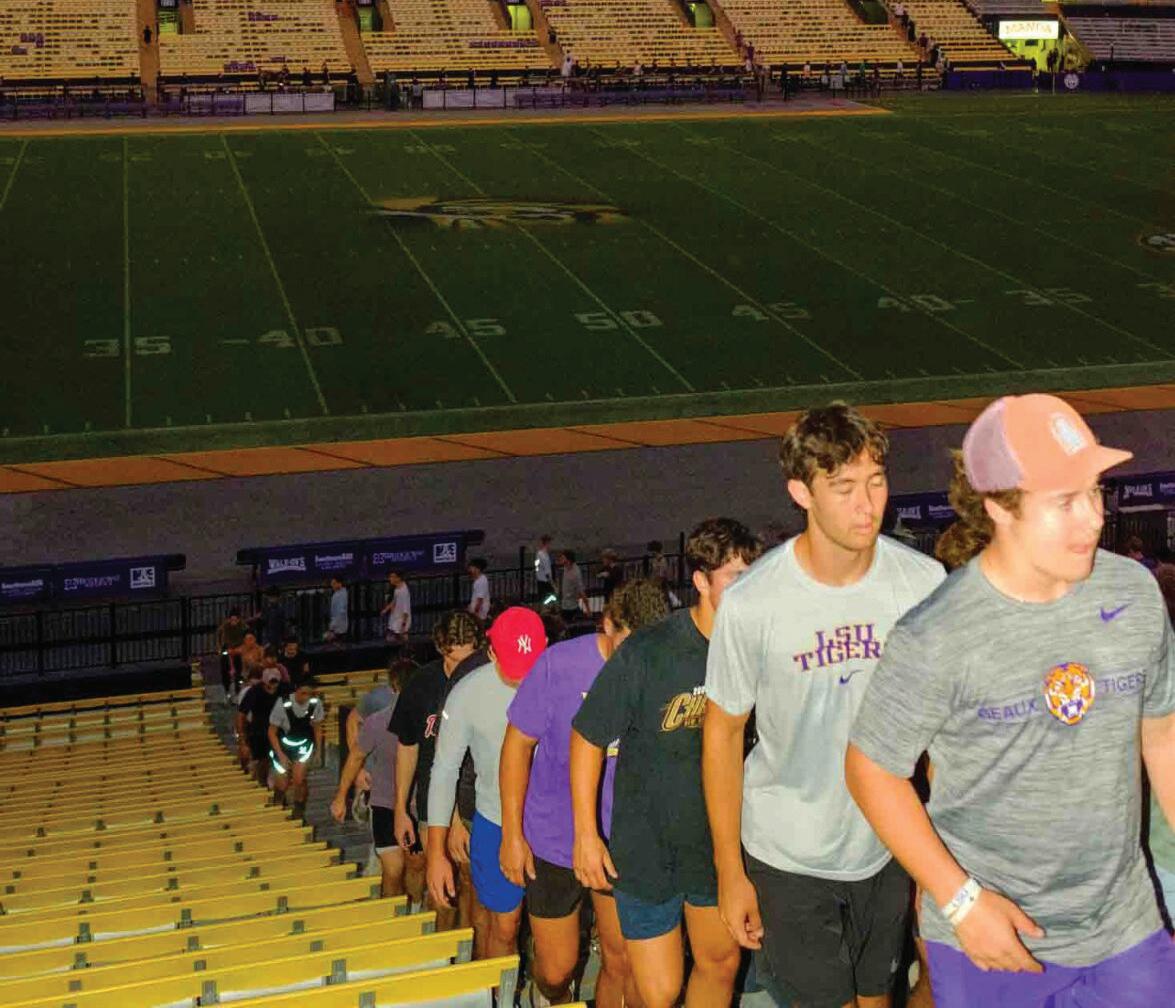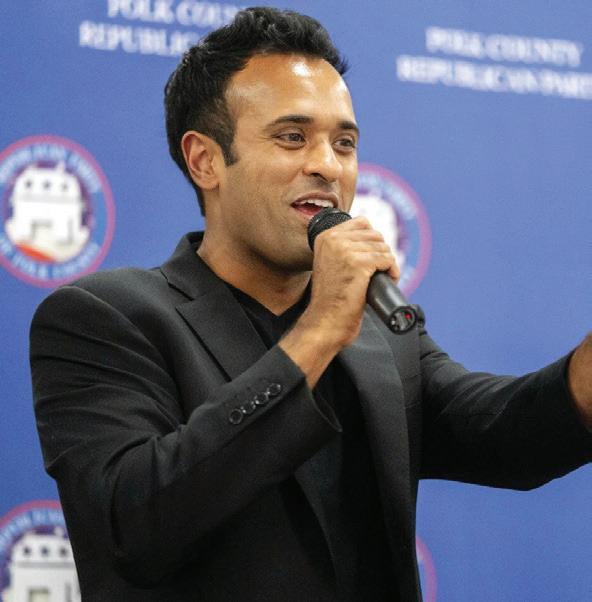DECISIONS...
Candidates for governor come to LSU ahead of Oct. 14 primary.


Read on page 2


Candidates for governor come to LSU ahead of Oct. 14 primary.


Read on page 2

Six governor hopefuls took the stage at LSU’s Student Union for a forum Wednesday evening to share their vision for higher education in Louisiana. Before the event, Reveille reporters conducted exclusive interviews with the candidates.
They touched on whether the state prioritizes athletics over academics, if they would change academic tenure, how they would appoint LSU Board of Supervisors’ members and why college students should come out to vote for them in the primary on Oct. 14.
The candidates included four Republicans: state Sen. Sharon Hewitt of Slidell, state Treasurer John Schroder, former business lobby head Stephen Waguespack and state Rep. Richard Nelson of Mandeville. Also participating were trial lawyer Hunter Lundy, a political independent, and former state Transportation Secretary Shawn Wilson, a Democrat.
Attorney General Jeff Landry, a Republican who leads in the polls, didn’t come to the forum. He has frequently skipped campaign stops that involve sharing a stage with the other candidates.
“Jeff Landry will be in Bossier tonight for an event with Donald Trump Jr.,” said Kate Kelly, Landry’s campaign spokesperson, in a statement to the Reveille. “He looks forward to talking about the issues with folks this Friday during Nexstar’s statewide debate.”
Tenure and DEI
Candidates generally said they would avoid meddling in university policies including academic tenure and diversity, equity and inclusion programs. Efforts to restrict such practices have cropped up in Louisiana and other states.
“The very nature of a university indicates the value of diversity,” Wilson said. “It indicates the value of equity and inclusion because education is designed to do that.”
Nelson called efforts to ban DEI programs “heavy handed” and that the government should “let universities make their own decisions.”
Waguespack echoed that, saying it’s “slippery slope when government starts mandating … some of those things.”
Schroder said he’s “not hardcore against anything.”
“I’m as diversified as anybody,” he said. “You know, we’re all born from the same drop of blood, right? So we got to love each other and try to get along with each other.”
Lundy said he would need to first see any legislation relating to DEI programs before deciding, but “without seeing it, I would
say oppose.”
Hewitt said “we have much bigger issues that we need to be focusing on in the Legislature.”
On tenure, she said “sometimes you have professors that have maybe been there too long, you know and so it would be nice to be able to kind of bring in some new blood.” But she said she understands the point behind tenure, that professors aren’t subject to the whims of changing political leaders.
Waguespack said he’s an “open book” on tenure and that he’s open to doing whatever is best for recruiting professors.
Wilson, who has a doctorate degree, said he supports tenure and found his tenured professors were more invested in Louisiana and in him.
Lundy, whose mother was a college professor and whose daughter teaches at a community college, again said he would have to see the legislation, but that he “supports academics.”
Schroder said he would keep his nose out of it as governor.
“I think the governor needs to get out of the higher ed business,” Schroder said. “...We need to sort of remove ourselves some from the campuses, from the Capitol standpoint, and let higher ed run its campus.”
Appointing the LSU Board of Supervisors
The governor appoints members to the LSU Board of Supervisors and other higher education boards. Candidates generally told the Reveille that they would value a variety of professional backgrounds in their appointments.
Several of them said pointedly they would ensure the appointments aren’t motivated by selfinterest.
Schroder said he would appoint “people who aren’t looking to enrich themselves, people who want to truly have … a board seat without overstepping their boundaries.
“None of my board appointees are going to overstep their boundary. They’re not here to run the university, right? They’re not,” he said. “They’re not here to get involved in the day-to-day operations of the hiring of the coaches, teachers.”
Such backroom deals have made national headlines. The Chronicle of Higher Education reported in 2021 that former LSU President F. King Alexander said members of the LSU board instructed him in April 2019 to fire Joe Alleva, the athletic director at the time, and replace him with Scott Woodward. One of the members even wrote on a napkin the salary he wanted Woodward to be paid, according to Alexander.
Waguespack said he would make sure his board appointments “do not view this as just an all-access pass to hang out in
locker rooms.” He said the board is not “meant to be a club to hang out at sporting events.”
He voiced his support of LSU President William F. Tate IV and his “scholarship first” agenda in an interview with the Reveille and during the forum. He said he would focus on board appointments, with both public and private sector experience, who would help accomplish Tate’s plans.
Wilson said “it’s not just about campaign contributions, it’s really about the expertise” when it comes to board members. He said a background in education is not necessarily a requirement for board appointments “because we don’t hire a board to micromanage.”
Nelson, who studied biological engineering at LSU, said he would value candidates with a background in science, math and technology. Did Brian Kelly get it right on LSU’s priorities?
Brian Kelly, LSU’s head football coach, raised eyebrows with comments he made in a recent ESPN interview suggesting the priorities at LSU were different than they were at his previous institution, the University of Notre Dame.
“There are priorities at Notre Dame,” Kelly said. “The architectural building needed to get built first. They ain’t building the architectural building here first. We’re building the athletic training facility first.”
Kelly later told the Louisiana Illuminator his comments were mischaracterized and that he came to LSU, in part, for its strong academics.
The Reveille asked candidates for their reaction to the coach’s comments and whether those who say the state puts athletics over academics are justified.
“Coach Kelly nailed it, man,” Nelson said. “I think that’s why … the reaction was what it was, is that everybody … feels that same way.”
Nelson said that when he was an LSU student, he saw rat infestations in the facilities and leaking roofs.
“We can be good at football and good at academics,” he said. “And I think that you really have to focus on that, though. It’s not going to happen on accident.”
Waguespack, who went to LSU and lives close to the campus, said LSU has already struck that balance.
“The truth is we’re a healthy mix here at LSU, and I think that’s a good thing that we need to sell to the rest of the country,” he said.
Lundy said he would want to see the numbers before he made a judgment, but that it’s important university facilities are taken care of and teachers are paid properly.
“I’ve been over at the coffee shop here and listening to professors and not getting paid what they deserve to be paid,” he said. “So we gotta focus on academics. We gotta focus on maintenance. We got buildings not just here, but all over the state with the [University of Louisiana] system that need repairs.”
Why should college students vote for you?
Young voters are often tagged as politically disinterested, but the candidates made their case for why LSU students should come out to vote for them in the Oct. 14 primary.
If no candidate gets more than 50% of the vote that day, there will be a general election between the top two vote-getters on Nov. 18.
“It’s time that Louisianians elect the CEO to be the governor of this state and get out all the politics and the cronyism,” said Schroder, highlighting his 32 years in business. “Corruption — this pay-to-play attitude — has infected the state and infected your campus.”

Hewitt, an LSU alumna, said she has one son in Seattle, Washington, and another in New York City—about as far as they could be from their hometown of Slidell.
“The real reason I’m running for governor is because I want to give families a reason to come to Louisiana and stay in Louisiana,” she said.
Waguespack, too, focused his pitch on making the state where people want to stay by increasing job opportunities and quality of life.
“If you elect a guy like me, I’m going to want to create an environment where everyone wants to grow old,” he said.
Lundy, the lone independent in the race, said he’s not beholden to any political party. He said his “heart’s in education,” and he would put priority on that as governor.
Nelson, 37, pointed out that he was the youngest person in the race. He said he’s lived a lot of the battles that students fight everyday. And he flexed that he tried to legalize recreational cannabis, “which I think is probably pretty popular among most younger people.”
Wilson traced his leadership back to his university days, including a tenure as study-body president at what is now the University of Louisiana at Lafayette.
“You have to focus on the students because they are our future,” Wilson said. “And so you’re looking at someone who understands that academic experience, understands the student experience and is committed to doing just that.”
Lauren Madden contributed to this report.
LSUReveille.com
@lsureveille
B-16 Hodges Hall
Louisiana State University Baton Rouge, La. 70803
NEWSROOM (225) 578-4811
Editor in Chief CLAIRE SULLIVAN
Managing Editor LAUREN MADDEN
Digital Editor JOHN BUZBEE
News Editor CROSS HARRIS
Deputy News Editor OLIVER BUTCHER
Sports Editor PETER RAUTERKUS
Deputy Sports Editor MACKAY SUIRE
Entertainment Editor MOLLY TERRELL
Opinion Editor COLIN FALCON
Multimedia Editor MATTHEW PERSCHALL
Production Editor MADISON COOPER
Chief Designer EMMA DUHÉ
ADVERTISING (225) 578-6090

Layout/Ad Design BEAU MARTINEZ
Layout/Ad Design SAMUEL NGUYEN

The Reveille holds accuracy and objectivity at the highest priority and wants to reassure its readers the reporting and content of the paper meets these standards. This space is reserved to recognize and correct any mistakes that may have been printed in The Daily Reveille. If you would like something corrected or clarified, please contact the editor at (225) 578-4811 or email editor@lsu.edu.
The Reveille is written, edited and produced solely by students of Louisiana State University. The Reveille is an independent entity of the Office of Student Media within the Manship School of Mass Communication. A single issue of The Reveille is free from multiple sites on campus and about 25 sites off campus. To obtain additional copies, please visit the Office of Student Media in B-39 Hodges Hall or email studentmedia@ lsu.edu. The Reveille is published biweekly during the fall, spring and summer semesters, except during holidays and final exams. The Reveille is funded through LSU students’ payments of the Student Media fee.
Stars still shone in the sky and the sun remained deep behind the horizon as hundreds of students gathered Monday morning to honor the memory of September 11th.
The air was cold. Crickets called. The city slept. Meanwhile students shook sleep from their limbs, filing into Tiger Stadium, readying themselves for the Sept. 11 memorial stair climb. The event, created by the LSU Corps of Cadets as a way to honor the tragic anniversary, has become a tradition since its inception last year.

“It’s important for us to do things like this—” said civil engineering senior Samuel Daigle, who serves as Logistics Officer for the Corps of Cadets. His voice cracked and rasped, a side effect of the yelling frequently involved in another of his leadership positions as Deputy Director of Operations for the LSU Air Force ROTC.
“To have this day, this moment, means a lot,” Daigle said, contemplating the rows of bleachers encircling the stadium.
In anticipation of the climb, many talked excitedly, tied and retied their tennis shoes, fidgeted with shirt-sleeves and skirtlengths. A few looked skyward.
LSU MANSHIP SCHOOLOthers grew silent in contemplation.
* Few dates give us pause as Sept. 11 does. Few days compel the same quality and degree of reflection.
On the attacks’ one year anniversary, Reveille columnist Jason Martin spoke volumes with a short phrase at the end of one, terse graph.
“A sense of fear still lingers—” he wrote, “—like a bad dream that’s long past.”
On that day 21 years ago, Martin wondered how our dedication to the memory of Sept. 11 would change over time.
“Today The Reveille and other newspapers around the country will have special pages dedicated to remembering this date. But what about next year? Will the headlines be similar on Sept. 11, 2021, to what they are today?”
Opposite Martin’s 2002 column, a collection of quotes detailed students’ memories from
the day the New York skyline folded in.
“I was in my media writing class and the professor came in and told us about the attacks,” said Chloe Wiley, who was then a sophomore studying mass communication, “I thought he was giving us another practice topic to write as an exercise.”
Of course, it wasn’t an exercise.
“I was confused and scared,” Wiley said, “I had the urge to go home and be with my family.”
Then-sophomore Patrick Trito was at work gathering materials from a warehouse when he heard the news on the radio.
“I can still remember all the faces, the shock and sadness and anger that everyone was feeling,” Trito said. “I remember the videos of the building being struck by the plane and it falling.”
Today, time has tempered the anger and fear. What was a raw cut now lies on the skin as a welt, a reminder of the old pain, still tender to the touch but perhaps healed.
Twenty-two years have passed since the attacks on the World Trade Center, Pentagon and the wreckage of Flight 93 opened a wound on U.S. soil, leaving thousands dead, thousands more bereft and the nation
Dr. Charles R. McDonald, known as the “Father of TOPS”, passed away Aug. 26th. Thousands of Louisiana residents have benefited from Taylor Opportunity Program for Students (originally named the Tuition Opportunity Program for Students), which he authored.
At the same time, most don’t know much about who McDonald was or the decades-long history of TOPS, the program that grants thousands of Louisiana students to access higher education each year.
Before the inception of the Tuition Opportunity Program for Students, there was TAP, the Tuition Assistance Plan, created in 1992.
TAP wasn’t the first tuition assistance program either. Its predecessor, the Louisiana College Tuition Plan, was created in 1989. Both programs helped young Louisianians access higher education but came with income caps that limited the number of students who could benefit.
TOPS was devised as a tuition assistance program without income caps. In 1997, the Louisiana
The LSU Manship School Hall of Fame welcomed four new members to its 2023 class who will be formally honored at the school’s annual gala on Sept. 21.
The Hall of Fame, entering its 47th year, “honors alumni and supporters who have achieved exceptional success in their careers” in a wide array of communications related fields, according to literature from the manship school.

Here are the honorees: Louis Day, Ph.D.
An expert in media law and ethics, Day holds the position of alumni professor emeritus at the Manship School. He earned his bachelor’s and master’s degrees in journalism from the University of Georgia and a Ph.D. in mass communication from Ohio University.
When asked about his research, Day said that he would like to see more graduate stu-
dents join interest in researching Law and Media Ethics. He has been teaching for over 30 years at LSU, running his courses with a high-engagement and heavily demanding style in order for students to come away with something they can use in the real world. Day has also worked as a television and radio news reporter, writer, editor, and for two years, he worked in public information with the U.S. military. While teaching the ethics course for the Manship School, Day couldn’t find a book he found suitable, so he decided to write his own. This book ended up being highly successful and went through five versions, becoming adopted by 80 other colleges and universities along the way.
“I hope that will inspire others to research and explore some of the issues covered, with a goal of identifying the best ethical practices across the media
9/11 MEMORIAL, from page 3 scarred.
Twenty-two years later, we continue to remember, but today, most LSU students are too young to have memories of their own. For them, 9/11 exists as a collection of others’ stories: those told by parents, friends and family; videos of black smoke pouring from the twin towers; photos of people falling from top floors and firefighters sifting through the deep, twisted rubble of the collapse.
At Monday’s stair climb, Commandant of the Corps of Cadets Lee Kostellic wore a buzz cut and a gray shirt. One of the few in attendance old enough to re -
HONOREES, from page 3 landscape,” Day said.
Connie Ledoux Book, Ph.D.
Book earned her bachelor’s degree in journalism from LSU and received her master’s degree in education and administration from Northwestern State University, then earned her doctorate from University of Georgia.
She spent the majority of her career as a member of Elon University. After 16 years at Elon, she took on the role of chief academic officer and the first female provost at the Citadel in 2015.
During her time at Elon, Book was an integral part in setting the standards for the “Bold-
TOPS, from page 3
Legislature passed Act 1375 and Act 287, and former governor Mike Foster signed TOPS into law.
In 2008, TOPS was renamed the “Taylor Opportunity Program for Students” to honor Patrick F. Taylor, the man who originally pushed for legislation assisting Louisiana students in the ‘80s.
Today, TOPS is 26 years old. During the 2022-23 school year,
member Sept. 11, he thought of his responsibility to pass on his knowledge.
It’s a “passing of the torch,” he said.
At the climb, students traced zigzags in the night up and down the bleachers above the visiting bench, then back to the beginning and again and again for eight laps.
Shirts drenched with sweat, hair stuck to foreheads in strands, heavy breathes punctuated the silence and the morning persisted in darkness.
But as the climbers warmed so, too, did their voices. Soon the empty stadium filled with calls, teasing, shouts, the patter of footfalls on the decline and
ly Elon” plan for 2030, with he goal to “sharply define Elon’s position as a top-100 national university.” Book also led the successful $250 million Elon LEADS campaign, which has funded more than 200 new scholarships and increased resources for the entire university.
Book launched several initiatives with public schools and Alamance Community College in order to continue her goal of being an advocate for access to education at all levels.
Bob Bocaccio
Bocaccio graduated from LSU with a degree in broadcast journalism in 1981 and would go on to open up his own business
the program helped 49,721 students gain access to higher education. More than 16,000 of the recipients attended LSU.


Since the inception of TOPS, over $4.5 billion has gone into helping more than 400,000 Louisiana students through their academic journeys. Many of those students would not have been able to go to school if it wasn’t for TOPS and the man who authored it.
thumping of soles on the incline.
“What y’all doing falling behind?” a student beamed, pumping her arms. “There’s a passing lane. Get there.”
A few who’d stopped to catch their breath in the cool air smiled back, jerking up to fall in line.
From the far side, a cadet began to sing.
“Tell me why.”
The crowd sang back, “Ain’t nothin’ but a heartache.”
“Tell me why.”
“Ain’t nothin’ but a mistake.”
Then, between the stadium and the sky, the sun began to rise.
The fast lapped the slow. The thoughtful stopped to check on the struggling. A few bounded.
located in Baton Rouge, called Bocaccio Productions, which between 1991 and 2016 helped produce NBA All-Star games, NCAA Final Fours, Super Bowls and six national championship football games.
Boccaccio also directed and produced LSU’s debut coach’s show, The Skip Bertman Show, and was the first call for ESPN, NFL Network and the SEC Network.
Bocaccio has also ventured outside of the sports realm, working on an Emmy Awardwinning American Roots documentary series as the director of photography. Throughout his career he worked with CBS,
McDonald was born May 4, 1939, in Jonesboro-Hodge Louisiana, according to his obituary, published by Mulhearn Funeral Homes of Winnsboro, Louisiana.
He graduated from Holly Ridge High School and Northeast Louisiana State College. Charles was a 2nd Lieutenant in the US Army and was present in Germany during the Berlin Wall crisis. He was honorably discharged in 1965.
Many plodded.
Five, six, seven, eight—in passing, climbers exchanged which lap they were on.
“Y’all on eight?” asked Kostellic, sweating.
“No, nine.”
“Y’all doing extra? After my own heart. Cause mine’s gonna blow up.”
Then he turned to the crowd.
“Let’s go! Go quick!” he shouted, “They did.”
In small groups, over the course of 20 odd minutes, the climbers finished, popping bottles of water and gathering to sweat and pant in the rows above the north box. When everyone was done, the crowd packed tightly together for a photo.
NBC, HBO, CNN, TBS, TNT, Bravo, History Channel, Discovery Channel, TLC and Fox News. When Hurricane Katrina struck Louisiana, he reported the recovery efforts for ABC World News.
Kurt
DavisDavis graduated from LSU in 1983 with a bachelor’s degree in journalism, was inducted into the LSU Alumni Association’s Hall of Distinction in 2020 and currently serves on the Manship School of Mass Communication’s Board of Visitors, as well as the Emma Bowen Foundation Board of Directors.
He has worked for 40-plus years in the broadcast industry as a journalist and corporate ex-
Afterward, McDonald worked as a teacher and coach at Oak Grove High School. He received a Master’s degree in Education Administration and an Ed.D. from The University of Louisiana Monroe, later becoming the Director of Financial Aid at ULM while also teaching.
In 1991, McDonald began his career in the Louisiana Legislature, where he served his constituents for nearly two decades.
Arms swung around shoulders. Grins spread across faces. The sun shone brightly on their bodies, and few shadows cast in the glow.
More than 20 years after Sept. 11, 2001, the day of great anger, fear, confusion and loss has become a day of memorial. Those who gather, gather to remember the dead but also to embrace the living. To embrace life.
Between shutter clicks, the cadets in the front filled their lungs and began, again, to sing.
“First to fight for the right, / And to build the nation’s might,” they swayed. “Proud of all we have done, / Fighting ‘til the battle’s won, / And the Army goes rolling along.”
ecutive and currently serves as executive vice president of CBS Affiliate Relations, managing daily operations and the relationship between hundreds of CBS affiliates across the nation.
Davis also worked for several local news stations throughout his career, including WSB-TV Atlanta, WDSU-TV New Orleans, KDFW-TV Dallas, WSET-TV Lynchburg, Virgina; KATV-TV Little Rock, Arkansas and WBRZTV Baton Rouge.
The Manship School Hall of Fame Annual Gala to honor the inductees will take place on Sept. 21, from 6 p.m. to 9 p.m. at the LSU Lod Cook Alumni Center.
He was the lead author of the Tuition Opportunity Program, and in 2017, he was appointed to the Louisiana Board of Regents, a state agency that coordinates public higher education in Louisiana.
“Dr. McDonald had a true servant’s heart, always working to help others,” said ULM president Dr. Ron Berry in an article from the university. “He was one of ULM’s strongest advocates. ”
Olivia Rodrigo released her sophomore album “GUTS” on Sept. 8th, and it had a lot to live up to after “SOUR” shattered all kinds of music records.

Compared to her Grammywinning debut, Rodrigo wanted “GUTS” to have more rock elements, and a majority of the songs give the same vibe as “brutal” and “jealousy, jealousy,” on her first album. With 12 tracks that total 39 minutes and 18 seconds long, it is similar in length to “SOUR” but is a completely different album sonically.
Hopes were high when she released the first single from the album, “vampire,” on June 30, and it was an immediate hit as it charted No.1 on both the Billboard Global 200 and Billboard Global Excl. U.S. charts.
Her other single, “bad idea right?,” launched her to No.1 on Billboard’s Hot Rock & Alternative Songs chart.
Rodrigo is two years older now, and “GUTS” displays this.
Instead of an album about being 17 and 18, it’s an album about being 20, which might not seem like such a difference until you listen.
She starts off the album with “all-american b-tch,” an ode to girlhood. Rodrigo knows how to say, “I am her,” without directly saying it, and this song represents exactly that. Her two singles follow it.
The song “lacy” is a slower melody. Who is this Lacy she speaks of? I have no clue, honestly, but the song is heartbreaking. Lyrics such as, “I despise my rotten mind and how much it worships you,” are enough to make a college girl cry.
The song “ballad of a homeschooled girl,” reflects Rodrigo’s view on social development and how living can just be awkward. She also points back to previous relationships and how a former partner may or may not have not been into her… or women in general.
One of my personal favorites is “making the bed.” While it is one of the sadder songs on the
album, it’s hands down one of the most pleasing listens in my opinion. It has some of her best lyricism.
The next track, “logical,” is classic Rodrigo. It mirrors “1 step forward, 3 steps back,” from her debut album. This is not a bad thing. When listening to her music, you have to remember that if it’s making you upset, she is doing her job.
The song “get him back!” is an anthem for getting back at a guy for doing her wrong. At first, the listener thinks she wants him back in a relationship until she says things like, “Wanna kiss his face with an uppercut.”
Rodrigo continues the album with “love is embarrassing.” Here she rants about feeling embarrassed about constantly going back to the same guy when he consistently proves that he will choose his ex or another girl. She also mentions lowering her standards and her friends’ disapproval.
The track “the grudge” is heart-wrenching and another one of my favorites. Rodrigo doesn’t
fail to make fans feel the same anguish she does during and after getting her heart broken. This is another one that wins a lyricism award in my books.
My favorite flow is in “pretty isn’t pretty.” The music she chose to match the lyrics fits perfectly. It also shows that even though she is older, she still faces the reality of being a young woman and the physical expectations that come with it.
She concludes the album with “teenage dream,” which was the best decision ever. This is where she actually says that she’s not the younger version of herself that released “SOUR.” It’s about thinking that life was so much better when she was just a teenage girl and how she fears the future.
Sophomore Nikhia Sims said that “GUTS” was not what she expected but in a good way. Her favorite song is “logical” because she “very deeply relates” to it and because the lyrics are so beautifully written. She was a super fan when “SOUR” came out and is excited that she has
two albums by Rodrigo she can enjoy.
“They both have a lot of really good songs that I can either listen to at my volume in the car or cry my eyes out to,” she said.
This album has the potential to top the charts and reach the records that “SOUR” did a few years ago. Rodrigo is only older than me by a year, and I feel like that is important to fans of our age range. We get to relate to and grow up with her as she releases these songs. Many like to call her the next Taylor Swift, but she is making her own name and defining herself as a singular artist.
Thursday at 11 a.m. SEPTEMBER 14th
Want
If you’re wondering what the job market is looking like and excited to make connections visit the LSU Career Expo. This event will be held at the Pete Maravich Assembly Center, N Stadium Dr. It begins at 11 a.m. to 4 p.m.
Involvement Fest
Azalea Hall Lawn
Saturday at 5 p.m. SEPTEMBER 16th
If you’re new to LSU or wanting to get more involved, Campus Life is hosting the Involvement Fest outside Azalea Hall. It will be from 11 a.m. to 2 p.m.
Constantinides New Music Ensemble
Louisiana Art and Science Museum
Louisiana Art and Science Museum, 100 S River Road, is hosting an event called CNME, Constantinides New Music Ensemble. This event will begin at 5 p.m.
West Baton Rouge Museum
This Sunday, enjoy some Cajun music at the West Baton Rouge Museum, 845 North Jefferson Avenue. This event is free and will run from at 3 p.m. to 5 p.m.
SEPTEMBER Friday at 11 a.m. 15th
SEPTEMBER 17 th Sunday at 3 p.m.
The recent drought is taking its toll on the University Lakes.












LSU football played two 11 a.m. games last season. A crushing 40-13 loss and SEC Westclinching 13-10 win seem on paper like polar opposite games. In both instances, though, LSU was far from its best.
Now in 2023, LSU starts its SEC schedule with an 11 a.m. matchup against Mississippi State in Starkville. It’s LSU’s first 11 a.m. kickoff since securing the SEC West at Arkansas last year, and in a seemingly wide-open SEC West, the upcoming game feels equally important.
“This is what gets everybody’s attention,” head coach Brian Kelly said at his Monday press conference. “This is really about the challenge of playing on the road, handling the 11 a.m. start, playing a really well coached football team.”
Early kickoffs, especially on the road, can be challenging for any team. For a team most known for its electric night games at home, it’s easy for an anti-11 a.m. narrative to grow.
For LSU in 2022, though, it was more than just a narrative.
In two 11 a.m. starts last season, LSU scored a combined 26 points. In both games, LSU started slow and never got the offense
in rhythm.
In a ranked, 11 a.m. showdown against Tennessee, LSU muffed the opening kickoff before giving up points on each of Tennessee’s first four drives. That, combined with inconsistency on offense, resulted in a 40-13 loss.
In the game that clinched the SEC West for LSU against Arkansas, the Tigers didn’t score a touchdown until the third quarter. Fortunately for LSU, Arkansas never found its offensive rhythm either and that combined with Harold Perkins’ heroics allowed LSU to escape with a 13-10 win.
Against Mississippi State, LSU hopes to start faster.
The difference in preparation happens in multiple stages for early kickoffs, both in practice during the week and the day of the game itself. During practice, Kelly said the team changed the way it starts each practice this week, going straight into team periods rather than the usual routine of starting with individual drills.
This is done to accelerate the team’s preparation and shift toward game speed, according to Kelly.
“You’ve got to turn it on immediately,” Kelly said.
The routine changes on gameday too. For night games, the team has a “shakeout” in the morning,
which is a short workout aimed to keep the team loose before the game later in the day.
That won’t happen Saturday, as the team will have its team meal at 7:20 a.m. before taking an hour bus ride from the hotel to the stadium, according to Kelly.
The change in schedule changes how players prepare for the game. One of those changes is in nutrition, as players will usually only have one meal before an 11 a.m. game, rather than multiple before a night game.
“You’re gonna have to get all your protein in the night before because you have one meal, and then you gotta hit the road early,” LSU defensive tackle Mekhi Wingo said.
For some players, though, early kickoffs are seen as a positive since it means less waiting around all day for the game.
“I feel like it’s better, though. Because waiting until 7 p.m. to play a game you’re just waiting in the hotel like, ‘Bruh, I’m ready to go,’” LSU wide receiver Malik Nabers said.
Nabers also talked about the importance of good sleep the night before an early game. While that may sound obvious, he admitted that it’s not always easy to sleep with the jitters of playing a game the next day, but that sleep is extra important for an early
game.
Having played in multiple 11 a.m. games in his career, Nabers wants to lean on his experience to lead and help the younger players through the routine.
“As a leader, I gotta lead by example,” Nabers said. “So, getting the guys in bed early, just stuff like that, because you gotta be up early.”
Against a Mississippi State team that plays a physical style on both sides of the ball, starting fast and not being affected by
the early start will be important. LSU knows from last season what those slow starts can mean, and the challenge is one that Kelly and the team understand.
“We’ve got a challenge in special teams. We’ve got a challenge in facing a veteran quarterback and outstanding running back and certainly the challenge that the defense brings in terms of its scheme and then going on the road to Starkville and the early start and all those things that you have to overcome,” Kelly said.
The LSU Tigers are gearing up to face Mississippi State in their Southeastern Conference opener at Davis Wade Stadium on Saturday. Both teams are hungry to secure their first conference win.


The Bulldogs come with ringing cowbells and dynamic key starters who have the power to make game-changing plays. Here’s a dive into some of the Bulldog standouts that LSU will need to watch and address.
The iconic Mike Leach air raid offensive style wasn’t adopted by new offensive coordinator Kevin Barbay. This change has allowed running back Jo’Quavious Marks to shine in the Bulldogs’ first two games.
Marks leads the SEC in rushing yards. He has three touchdowns this season and averages 125 yards per game and 5.8 yards per rush. Marks could spell trouble for the Tigers, so LSU’s front seven must plug gaps and not get pushed back to prevent explosive runs. Marks also has 91 receiving yards. LSU will need to cover him in the backfield and swarm him on checkdowns.
Will Rogers
In the Bulldogs’ win over Arizona, Rogers was 13 for 17, had
162 passing yards and scored three touchdowns with zero interceptions. He holds the SEC record for pass completions right above Joe Burrow.
This season, Rogers has 389 passing yards and five touchdowns. He is mostly a pocket passer. The LSU pass rush should aim to take advantage of that, something they haven’t done this season with only one sack on the year as a team.
Lideatrick “Tulu” Griffin
Griffin was named to the Sporting News Preseason All-American Team and leads the Bulldogs in receiving yards. He’ll use his speed to his advantage against the Tigers secondary.
Griffin has 116 receiving yards and often uses his legs for those key extra yards. LSU’s defensive backs will need to keep more than a watchful eye on him.
Defensive players:
Jett Johnson
In Week 2, Johnson was named SEC Defensive Player of the Week for his performance against Arizona. He recorded the most solo tackles for the Bulldogs last season and continues to top the category this year with 10.
Johnson had two interceptions in the Bulldogs’ last game and has two sacks this season. It’s crucial for the Tigers to work around him on both the run and pass with his ability to read the play.
He’s a versatile linebacker and has the ability to stop the run, rush the passer and drop into coverage.
Nathaniel Watson Watson, another linebacker, has 18 total tackles with six solo tackles in two games. He finished second in tackles in the SEC last
season with 113, behind his fellow Bulldog Johnson who had 115.
Watson and Johnson both lead the team in sacks and interceptions. They’re positioned on the inside for Mississippi State, which means LSU will have to watch out for them on blitzes and in zone coverage.
Decamerion Richardson Richardson had 11 total tackles at corner against LSU last season, which was his career high in one game. Last week, he had two pass breakups against Arizona. Richardson has the third most tackles behind Watson and Johnson this season.



First, which God? Ramswamy is Hindu, but also somehow a Christian nationalist.
Eight GOP presidential candidates gathered in Milwaukee, Wisconsin on Aug. 23 for the first of several debates.
They spent about two hours presenting their plans for the future of the Republican Party and the country, all the while ripping into each other, President Joe Biden and even former President Donald Trump, who refused to participate.
From literal fascists and Christian conservatives to culture warriors and actual lunatics, these are the GOP candidates, reviewed:

Ron DeSantis has been governor of Florida since 2019 and is a former congressman. As an incumbent governor of a large state, he has a lengthy and recent record to examine. That is part of the problem. On top of his vague threats to “destroy leftism,” he has embarked on a tour of abusing governmental power by disrupting higher education and fighting with Disney, one of the only reasons any sane person would ever go to Florida with him as governor.

Vivek Ramaswamy is a businessman who has become a rising star among both the politically illiterate and the conspiratorial fringe.
His big campaign platform is called “Truth,” indicating that it is most likely anything but. Among these “true” statements are things like “God is real,” “human flourishing requires fossil fuels,” and “there are three branches of government, not four.”
These are all rather confusing.
Second, “human flourishing”? That seems like a very intellectual and philosophical phrase for the anti-elitist and faux populist Ramaswamy. Also, he talks about oil and coal in the same way a normal person would talk about education, agriculture and the arts. This is the same man who called climate change a “hoax” and the “anticarbon agenda” the “wet-blanket” on the U.S. economy. Perhaps we shouldn’t listen to him about what’s best for humanity?
Third, what exactly is the supposed “fourth branch?” This is a reference to the bureaucracy. Ramaswamy would like to gut the federal government…because… populism? The implication is that the bureaucracy is the “deep state,” a cesspool of corruption devoted to suppressing conservatives and bolstering liberals. In reality, the bureaucracy is the executive branch. Without it, the private sector would be greatly empowered as the state falters. That would be worse for the “common man,” but maybe that’s what he actually wants.
Anyway, Mike Pence was vice President from 2017 to 2021 and before that the governor of Indiana and a congressman. Pence is the stereotypical, evangelical, conservative politician, complete with a milquetoast personality and nonstop references to his lord and savior—Ronald Reagan, that is.
On Jan. 6, 2021 Pence stood up to Trump and arguably helped save American democracy. However, it is possible to both thank him for this and oppose his noxious policies and positions.
Nikki Haley served as ambassador to the United Nations during
the Trump administration, and before that, she was the governor of South Carolina and a state legislator. As an Indian American and the only woman in the primary, Haley presents the GOP with the opportunity to embrace, or at least tepidly acknowledge, diversity.
She also has extensive foreign policy experience and demonstrated it during the debate, when she relentlessly attacked Ramswamy’s ignorance and idiocy on the subject.
Chris Christie was governor of New Jersey from 2010 to 2018 and before that a United States attorney. This is his second campaign for president after 2016. Christie is well-known for three things: his excessively (and often offensively) mocked weight, his abrasive personality and his many scandals.

He has been more than willing to attack his former friend Donald Trump and is perhaps the most
transparent person in the race: the Chris Christie you see on stage is the real Chris Christie. The problem is that his real self is kind of a jerk. That’s useful in taking down terrible people like DeSantis, Ramaswamy and Trump, but not a good quality for a President.
Tim Scott has been a senator for South Carolina since 2013 and was a congressman and a state legislator before that. One of the few Black Republicans to hold federal office in recent years, Scott is often held up as some sort of optimistic figure hoping to guide the country toward racial harmony.
In reality, he is a Christian nationalist who traces his earliest political success to the promotion of the ahistorical role of the Ten Commandments in American political and cultural history. His vision for the country may be presented with a sunny disposition, but it is an exclusionary vision that would leave many in the dark.
Asa Hutchinson was governor of Arkansas from 2015 to 2023 and previously served as the administrator of the Drug Enforcement Administration under George W. Bush. He has a sort of folksy Southern charm and is arguably the most anti-Trump Republican in the race, but he is a lacklaster debater and has some contradictory views on social issues like transgender rights.
Doug Burgum is a businessman who has served as governor of North Dakota since 2016. He is incredibly wealthy and has managed to get this far mostly on his own money, especially since his policies and personality are nothing to write home about. That’s about it.
EDITORIAL BOARD Claire Sullivan Editor in Chief Managing Editor Lauren Madden Cross Harris News Editor Deputy News Editor Oliver Butcher Colin Falcon Opinion Editor
Colin Falcon Opinion Editor
Those are all the candidates who both qualified and attended the debate.
There are several others: businessman (and living joke) Perry Johnson, anti-Trump moderate former congressman Will Hurd, megachurch pastor Ryan Binkley and radio personality Larry Elder.
All of them have an even smaller chance of getting anywhere than Hutchinson and Burgum.
In the end, each of the candidates has deep flaws, but the most important concern is whether they are worse than a potential second Trump term.
For most of the candidates, the answer is a less-than-enthusiastic yes, but Ramaswamy and especially DeSantis would drive the country further apart and may even be worse than Trump.
While Trump appeals to fascism, DeSantis is an actual ideological fascist. Trump just wants attention; DeSantis wants a country where people like him and ideas like his are dominant to all others.
His politics fly in the face of everything a good political philosophy should be. He should be hoping to solve every person, group and demographic’s problems, but he has a rather small idea of who gets to participate in our democracy. He is not actually running to be president of the United States; he is running to be the president of the Republicans, the conservatives, the white people, the wealthy, the rurals. If elected, he’ll govern like that, too.
The Reveille (USPS 145-800) is written, edited and produced solely by students of Louisiana State University. The Reveille is an independent entity of the Office of Student Media within the Manship School of Mass Communication. Signed opinions are those of the author and do not necessarily represent the views of the editor, The Reveille or the university. Letters submitted for publication should be sent via e-mail to editor@lsu.edu or delivered to B-39 Hodges Hall. They must be 400 words or less. Letters must provide a contact phone number for verification purposes, which will not be printed. The Reveille reserves the right to edit letters and guest columns for space consideration while preserving the original intent. The Reveille also reserves the right to reject any letter without notification of the author. Writers must include their full names and phone numbers. The Reveille’s editor in chief, hired every semester by the LSU Student Media Board, has final authority on all editorial decisions.
“Those who cannot understand how to put their thoughts on ice should not enter into the heat of debate.”
Friedrich NietzscheGerman philosopher 1844
Friday, September 22 | 11 a.m. - 2 p.m. LSU Parade Ground


Celebrating the Spirit of LSU


Food, Fun, and Entertainment
Free for LSU students